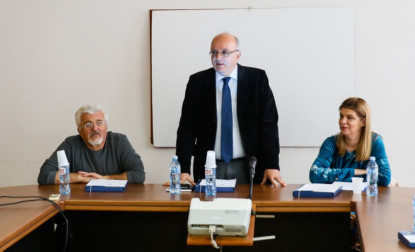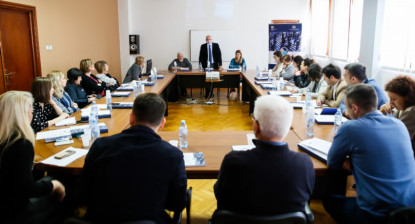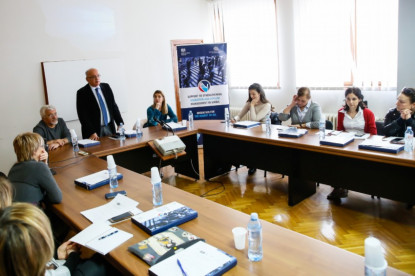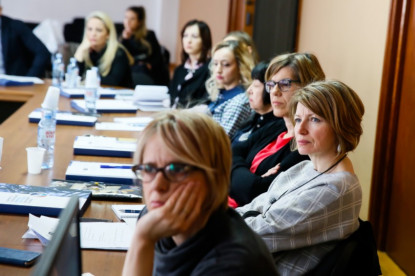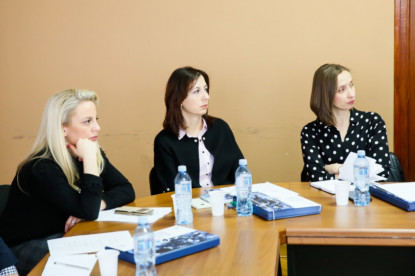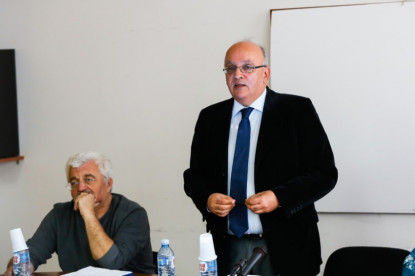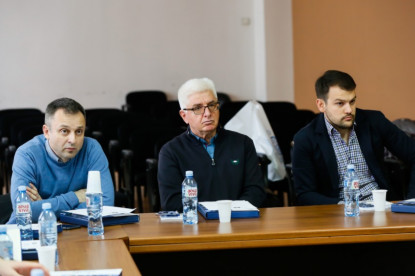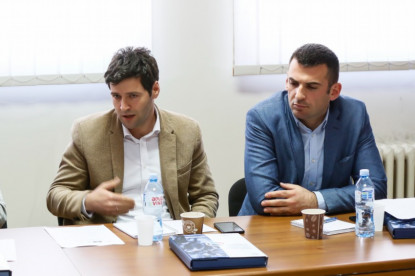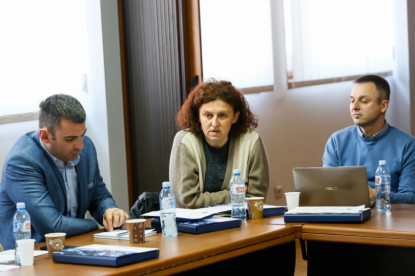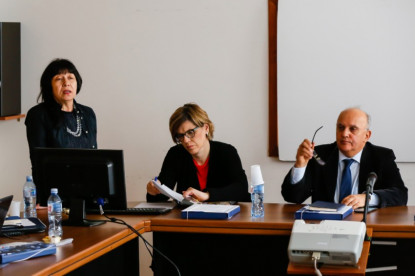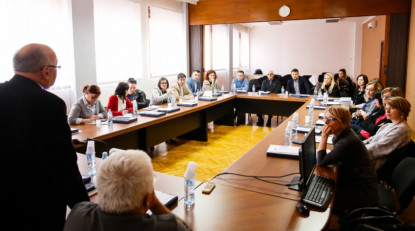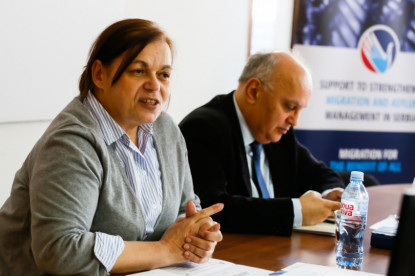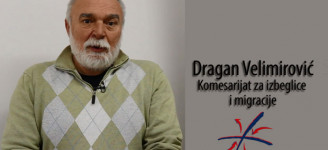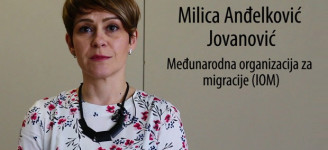Kick-off of the official regional cooperation within the CRS Training Centre in Plandište
Within the second phase of the "Support to strengthening migration and asylum management in the Republic of Serbia" Project, implemented by the International Organization for Migration (IOM) with the support of the British Embassy, the initial meeting concerning the establishment of cooperation within the Training Centre of the Commissariat for Refugees and Migration of the Republic of Serbia (CRS) was held at the Institute of Social Sciences in Belgrade. The training centre was founded on the initiative of the Commissariat for Refugees and Migration of the Republic of Serbia with a view to providing adequate migration management training, additional education and research facility.
In addition to representatives of the Commissariat for Refugees and Migration of the Republic of Serbia and the Institute of Social Sciences, the meeting was attended by guests from the Institute for Migration and Ethnic Studies from Zagreb, Faculty of International Economics, Finance and Business from Podgorica, Institute for Strategic Studies and Projections from Podgorica, Faculty of Law of the "St. Clement of Ohrid" University from Bitola, and the Institute of Economics of the "Cyril and Methodius" University in Skopje.
The meeting discussed migration management system topics relevant for all countries in the region, possibilities for deepening cooperation and establishing a regional network, as well as other important matters. The meeting was opened by Lidija Marković, Head of the International Organization for Migration (IOM), Vladimir Cucić, Commissioner for Refugees and Migration of the Republic of Serbia (CRS), and Goran Bašić, director of the Institute of Social Sciences.
- The establishment of the Migration Training Centre ensued from the mandate of the Commissariat for Refugees and Migration, which, among other things, involves collection, consolidation and analysis of data and indicators concerning migration management, reporting on immigration and emigration, drafting and regular updating of the migration profile of the Republic of Serbia, cooperation with members of the European migration network, training and development of staff who perform migration management tasks, Vladimir Cucić, Commissioner for Refugees and Migration, explained.
Position of Serbia, as a country at the cross-roads between the East and the West, and huge migration movements, he explained, have resulted in the development of responses in situations of migration crises, emergency care, reception, norms and monitoring of migration flows... The experience of Serbia in these areas will be available within the Training Centre to all interested actors because the countries of the region need to exchange their experiences and specific skills in dealing with the problem of large influx of migrants.
- By combining experience, knowledge and standards, within the Training Centre in Plandište, the Commissariat aims to provide the transfer of specific skills to staff working in public administration, local self-governments, NGOs, international organizations, and to all other actors involved in migration in Serbia, the region and beyond.
The Commissariat will implement certified programs in the Training Centre, that will be delivered by trainers from CRS, but also through engaging a large number of associates and experts from the country, region and abroad. The trainings are intended for: civil servants from the country and the region, local government staff, students, practitioners preparing for humanitarian operations and all other institutions and individuals in the country and abroad dealing with migration issues, and for non-governmental organizations.
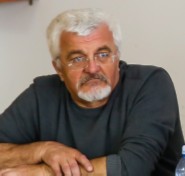 - The Research Centre within the Migration Training Centre can be used for the creation of a migration research database that would help relevant actors in identifying migration needs and, correspondingly, in creating programs and projects that will successfully respond to migration challenges. In that sense, the Centre would be of great importance for students, universities, institutes and other organizations engaged in research work, and the establishment of cooperation with the Institute of Social Studies is only the first step in this direction, Vladimir Cucić emphasized.
- The Research Centre within the Migration Training Centre can be used for the creation of a migration research database that would help relevant actors in identifying migration needs and, correspondingly, in creating programs and projects that will successfully respond to migration challenges. In that sense, the Centre would be of great importance for students, universities, institutes and other organizations engaged in research work, and the establishment of cooperation with the Institute of Social Studies is only the first step in this direction, Vladimir Cucić emphasized.
- The CRS Training Centre is important not only as an idea, but also because of the need to organize various types of trainings, and additional education courses for relevant actors from public administration, civil society, those involved in the educational process, health care, and all the others dealing with migrants and migration management. There are many dilemmas that needs to be resolved, not only in Serbia. It turned out that Europe, despite a better education system and a much more organized public administration, did not have answers to all migration-related issues.
This idea to establish a Training Centre is excellent and it is important to mobilize around it research institutions and universities in order to ensure a unified support to a process thus specific as migrations. We must work hard on this because we do not have developed integrative policies and we do not have enough experience, while there is a need for an open migration policy that would empower economically both Serbia and the entire region.
 The idea of establishing a Training Centre has been well received in the region because we are all troubled by the same problems, because none of us have answers to all the questions, and the Western Balkans will probably have to face the fact that migrants will be staying in our countries for some time either while undergoing asylum procedure or until they find a way to continue their journey to Western Europe. And at one point in time, provided there is stability and economic progress, they’ll opt to stay, so that the countries of the Western Balkans would become their final destinations - Goran Bašić, director of the Institute of Social Sciences explained.
The idea of establishing a Training Centre has been well received in the region because we are all troubled by the same problems, because none of us have answers to all the questions, and the Western Balkans will probably have to face the fact that migrants will be staying in our countries for some time either while undergoing asylum procedure or until they find a way to continue their journey to Western Europe. And at one point in time, provided there is stability and economic progress, they’ll opt to stay, so that the countries of the Western Balkans would become their final destinations - Goran Bašić, director of the Institute of Social Sciences explained.
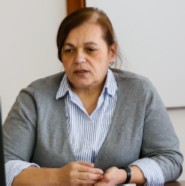 - In addition to giving detailed and very clear answers to the question who manages migrations and what kind of training programs we need, Svetlana Velimirović, assistant commissioner for refugees and migration, also presented her impressions from the meeting.
- In addition to giving detailed and very clear answers to the question who manages migrations and what kind of training programs we need, Svetlana Velimirović, assistant commissioner for refugees and migration, also presented her impressions from the meeting.
As regards the Commissariat for Refugees and Migration of the Republic of Serbia, we have been building our capacities for years and preparing ourselves because there is a very wide range of trainings that can be held at the Training Centre. Together with the International Organization for Migration (IOM) we have already developed certain curricula through several projects, which enables us to deliver trainings for our staff, staff of local self-government units, and for other service providers. We have been doing this also before, but now we are upgrading our trainings because new people are coming, and also because circumstances have changed.
I expect that in the following period we shall expand our trainings and standardize them, improve their quality and perspectives, and combine science and profession. Synergy between practitioners and scientists should provide additional quality, and at the regional level, cooperation among all actors should help us come to answers to unspoken questions faster and more easily. All of us, as we have heard today, share the same problems and dilemmas, and with a better coordination we shall resolve many issues together.
Mirjana Rašević, Ph.D., from the Institute of Social Sciences and Sanja Klempić Bogadi, Ph.D., from the Zagreb Institute for Migration and Ethnic Studies spoke about the research in the function of migration management, and in the final part of the meeting there was a constructive discussion on the possibilities, methods and objectives of regional cooperation within the CRS Training Centre.
The two-day kick-off meeting was concluded on Saturday, 23 March, with a visit to the Training Centre in Plandište.





